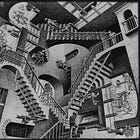"Is Mankind Free?" : Free Will, Agency, & Personal Responsibility | Existential Basics 4
a Short Essay for the Modern Existentialist
Man is condemned to be free. Condemned because he did not choose his own creation, yet nevertheless exists in the possession of his own liberty. … Man is condemned to be free; for, once he has been thrown into the world, he will have become responsible for everything he does. It is up to you [alone] to give your existence meaning.
1 | Fundamental Subjectivity; Fundamental Agency
Let’s talk Agency.
Previously, in:
We established that our reality is Fundamentally Subjective—that:
We can and do only experience the world through the lens of our own perception.
Everything that we can know (to a reasonable degree of certainty) is necessarily a form of empirical knowledge—therefore, anything that we can’t confirm (to a reasonable degree of certainty) constitutes dogmatic knowledge.
Fundamental Agency is the idea that, because our experience can only ever be Subjective—because we live a personal fiction—we’re therefore always responsible for the things that we think and do. It’s the idea that:
We, as Agents, are always in control of our selves—always responsible for the actions we take, and the way we choose to affect the world.
As Subjects and Agents, we create the world we experience—we act upon it, and are therefore empirically responsible for having imparted Subjective meaning onto that world through the exercise of our Agency.
In other words:
2 | Free Will vs. Agency: A Dogmatic Conflation
More often than not, our concept of personal Agency will be mistaken for the idea of Free Will—after all, they do deal in similar subject matter. Where they differ, however, is in the context which they’re used.
When referenced, Free Will is typically intended to invoke some vague idea of absolute freedom, typically theorized as a kind of inherent property of human existence. Our concept of Agency, however, refers instead to the real-world, actual, empirically verifiable human freedom we observe, and which we therefore understand our selves to be in possession of.
Thousands of years of heated debate have been dedicated to this shallow ideal of Free Will. Self-described academics and intellectuals have been arguing back and forth since the dawn of human history about whether or not people actually have the ability and responsibility to make their own choices. And yet, even in all that time… none of them seem to have made any progress at all.
This debate is framed as a conflict between the ideas of Free Will and Determinism—namely, whether or not these two ideas—which seem so irreconcilable—can actually both be true at the same time.
Free Will is the idea that human beings have the ability to make meaningful (or any, for that matter) choices of their own.
Determinism, on the other hand, is the idea that every decision which a human being makes is, in reality, just a function of either:
1: Their base, biological drives and imperatives, or
2: Some kind of divine, cosmic will which decides our fate without our knowledge or consent.
The former is a school of thought called Biological Determinism—a position foundational to Nihilist-Absurdist philosophy. The latter is called Predestination—a theory commonly touted by Dogmatists of various kinds.
Our empirical concept of Agency, however, has no stake in this argument—no horse in a dogmatic race. This fundamental disagreement over the ideas of Free Will and Determinism is, in reality, just a debate over the true nature of a theoretical, metaphysically Objective world. In other words, this argument deals only in absolute, Objective claims to metaphysical knowledge; to ideas which we can’t really know to any degree of certainty.
So, as Existentialists, we can understand that—at least, to the best of our knowledge—we can’t know for certain whether or not man is truly, Objectively, metaphysically free. The best we can know is that, in the end, we think and feel as though we’re free inside of our minds—and, that we act as though we’re free as we live out our lives in this physical world. And so we, as Existentialists, can feel confident in our assumption—our empirical observation—that we are free within our means.
Free to be Subjects and Agentive actors within an inaccessible, Objective world.
That’s what Agency means.
…
So, Nietzsche calls it the “Will to Power”; literally, our drive to express our Power—our ability to act—and to use it to shape the world into what we want it to be. Sartre calls it… well, “Agency”, or “Freedom”, and famously says that:
To be condemned to be free means that there’s only really one thing in this world over which we have no control—no Power to choose or decide. And that is the fact that we must always choose—that we always have to decide. You are an Agent—you’re always an Agent, and therefore always in control—always responsible for the choices that you make and the actions which you choose to take in this physical, observable world.
3 | Condemned to be Free
At this point, one might be tempted to say:
But we can’t possibly always be free to choose, because… sometimes we just don’t have a choice! There’s no way that we can possibly choose what our circumstances are, after all. We can’t choose the situations we’re put in—therefore, we’re not always free to choose!
And, while it is true that we’re not able to choose or control Facticity—not able to determine the way that our situation came to be—that’s… really completely beside the point. There’s no claim being made here as to whether or not we have the ability to choose our circumstances. Instead, what Sartre says here is that:
Within every given circumstance, we still always must make a choice.
Regardless of the context of any situation, an Agent is always agentive, and always has the ability to choose and decide.
Imagine a man—let’s call him Fred—who’s chronically sick all the time. He has no choice in his situation; after all, it’s not like it was ever up to him to choose how healthy his is at baseline. That simply wasn’t his choice to make—wasn’t a function of his Agency. He does, however, in another sense, always have a choice, because he always gets to choose how he reacts to his situation. His choice comes in his Subjectivity—in how he chooses to express his Agency, and how he’ll choose to deal with his sickness. He could choose, after all, to try and improve his hygiene, so that he might get sick less often. He could choose to medicate whenever the sickness flares up, hoping that it might go away more quickly. Or, he could choose to just lie down and give up, and let the illness just run its course. All of these are choices—and he must choose.
Let’s say that, one day, Fred’s illness takes a turn for the worse—that it’s much more serious than he’d first imagined. It infects his brain, sending him to the hospital, where the doctors tell him that—because of his disease—he’s now a quadriplegic: completely paralyzed and unable to move his body. In this matter, he obviously didn’t have a choice. He didn’t get to choose or decide how bad his sickness would become. But, still—even when he’s trapped in the prison which his body has become—there are choices that he must make. He could choose to give up—to surrender to his disease, and lay there wallowing in misery and self-pity as he watches himself waste away. He could choose to hold on to hope—hope that one day, some doctor or scientist somewhere out there might figure out a way to save him. Or, he could choose to accept his condition, and learn how to live and cope with his new life. These are all choices—and he must make a choice.
In the end, Sartre says this:
As Agents, we must always choose. After all, even if you were to choose not to make a choice… you’d still just have made one anyway:
The choice to not choose.
4 | Conclusions
There’s two senses in which people tend to use the word “responsibility”: two ways in which it can be defined. The first is a moral one—the way in which Dogmatists and Nihilist-Absurdists both see it. They think of “responsibility” as forward-looking; a declaration of what individuals should do in the future. The second sense, however—the sense in which we, as Existentialists conceive of it—is an empirical one. We see “responsibility” as backward-looking; just simply a claim that we, as Agents, are each responsible for having done the things that we have done in the past.
And so, if asked, the Dogmatist will tell us that:
“Personal responsibility” means to be moral—to do what’s right and not do what’s wrong for the sake of a better future.
The Nihilist and the Absurdist both, on the other hand, would be quick to say that:
“Personal responsibility” is fake, and doesn’t exist—that the hope for a better tomorrow is a lie that we tell ourselves in order to try and cope with the sheer absurdity of existence.
We, however, as Existentialists know, that “personal responsibility” doesn’t mean anything so special—that it’s not any kind of claim to some grand, metaphysical theory of ethics or an Objective morality; not a claim to know what’s right or wrong with absolute certainty. “Personal responsibility” just simply means that:
We will always have become responsible for the things which we’ve chosen to do. Because we do things in the world, we are therefore responsible for their doing.
We are responsible for the expressions of our Agency—for the world we create and the meaning we impart, and for the value which we choose to assign.













